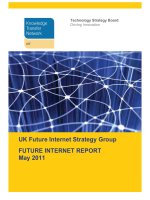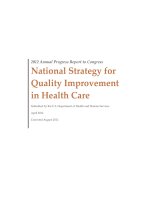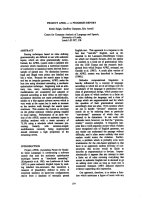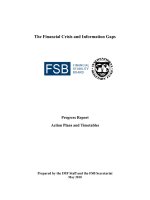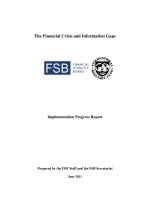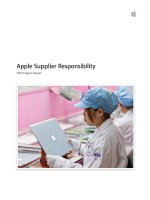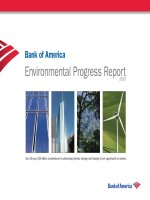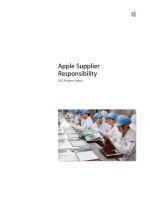responsible-future-progress-report
Bạn đang xem bản rút gọn của tài liệu. Xem và tải ngay bản đầy đủ của tài liệu tại đây (3.26 MB, 72 trang )
BIRMINGHAM
BUSINESS
SCHOOL
Working for a Responsible Future
Sharing Information On Progress Report
Birmingham Business School
2017 - 2018
‘Triple-crown’
accredited
‘Triple-crown’
accredited
‘Triple-crown’
accredited
Executive Summary
We are proud to announce our first Sharing Information on Progress (SIP)
report on the United Nations Global Compact (UNGC),
Principles for Responsible Management Education (PRME).
The principles and network of the PRME signatories are strongly aligned with our vision to
“Promote Curiosity and Thought Leadership for Responsible Business”.
Birmingham Business School would like to feature four key events since joining the PRME
in January 2017:
• The opening of the Responsible Business Centre in 2017
• The design of a responsible business focused strategy for the Business School
• The recruitment of key responsible business academics
• The recruitment of one responsible business teaching-focused lecturer
The report is divided into six main sections, that illustrate how Birmingham Business School
addresses the six principles of PRME: About the School, Education, Research, Campus,
Partnership and Dialogue. One last section summarises the work of the Business School
per Sustainable Development Goal (SDG).
PRME REPORT PROJECT TEAM
Under the supervision of Professor Isabelle Szmigin, Deputy Dean.
PRME CHAMPIONS
Nishat Azmat is a Lecturer in Accounting. She has taught in the Birmingham Business
School for over 10 years. Previously she was a practitioner who worked in both industry and
private practice. She is currently on the board of trustees for two different charities.
Dr. Delphine Gibassier is Senior Research Fellow. She researches accounting for sustainable development and responsible business practices, such as responsible leadership and
plastic pollution.
PRME REPORT ASSISTANCE
Raeni (see profile on page 33) is a PhD student in the Department of Accounting.
Her doctoral research is looking at green financial instruments and accountability of
organisational fields to address climate change issues in emerging countries. She also
actively promotes accessibility of education for the low-income family on several TV
Programmes in Indonesia.
With the help and participation of the entire Birmingham Business School. We are grateful
for the large participation of everyone in the Business School to the realization of this first
SIP report.
CONTENTS
EXECUTIVE SUMMARY..............................................................................
TABLE OF CONTENTS ...............................................................................
LETTER FROM THE DEAN .........................................................................
THE IMPORTANCE OF PRME.....................................................................
ABOUT THE SCHOOL................................................................................
1.
2.
3.
4.
03
04
05
06
07
Vision, Mission, Values
Presentation of the Business School
Gender Equality, Equal Opportunity, Well-Being and Mental Health
Birmingham Business School History
5. Strategy
EDUCATION............................................................................................... 22
1. Formal Curriculum
2. Informal Curriculum
RESEARCH ................................................................................................ 30
1.
2.
3.
4.
5.
6.
7.
Key Hires in the Responsible Business
Future Thought Leaders
Key Funding for Responsible Business Research
Engaged Research
Focus on Diversity Research
Research Centres focusing on Responsible Business
Research Clusters
CAMPUS.................................................................................................... 46
ENGAGEMENT & PARTNERSHIPS ............................................................. 47
1.
2.
3.
4.
5.
Key Responsible Business Partners
The SeaBOS Project
Industrial Engagement for Responsible Business Teaching
WE-LEAD Entrepreneurs in Residence Programme
Advisory Board – Guest Lecture
DIALOGUE ................................................................................................. 54
INSPIRATIONAL WOMEN .......................................................................... 56
SUMMARY PER SUSTAINABLE DEVELOPMENT GOAL ............................. 58
APPENDICES ............................................................................................ 61
1. A Selection of Key Publications in Responsible Business
2. List of PhD Thesis in Responsible Business
3. Responsible Business Events
4. Blogs on Responsible Business
THE MAKING OF THE FIRST SIP REPORT ................................................. 70
4
LETTER FROM THE DEAN
As Dean of Birmingham Business
School, I am delighted to support our
commitment to the six principles for
Responsible Management Education.
We see our continued commitment to
PRME as a key component of our aim
to develop both responsible business
education and thought leadership.
Responsible business is a key aspect of all our activities
at Birmingham Business School. Indeed, our vision for
the School is to promote curiosity and thought leadership
for responsible business. Our mission is to deliver
internationally recognised research focusing upon the
key challenges around responsible business that face our
economy and our society both regionally and globally. Our
intention is that this research both informs and enhances
our educational delivery.
One of the most exciting developments of the last year
has been the opening of our Lloyds Banking Group
Centre for Responsible Business. The Centre will build
on our existing teaching initiatives with the intention of
becoming recognised as a leading provider of responsible
business education across the world. We are currently
seeking to develop sector-leading educational modules,
programmes and learning materials to complement
existing educational offers. Our aim is to develop
Responsible Business Professionals, through our
educational practices, capable of helping to transform
the organisations of the future and deliver the positive
outcomes we need.
We look forward to our continued commitment to PRME
and reporting upon the success of our endeavours.
Professor Catherine Cassell
Dean, Birmingham Business School
5
The Importance of PRME
Principle of Responsible Management Education (PRME) is a leading initiative in
the global movement to connect and inspire management of education in achieving
the Sustainable Development Goals (SDGs).
Since its establishment in 2007 at the UN Global Compact Leader’s Summit in Geneva, PRME has been the primary
organisation to build partnership among business schools and the United Nations. The presence of PRME has
transformed Birmingham Business School’s management of education including teaching, research and external
engagement to embrace the SDGs.
The PRME goal is aligned with our vision in ‘Promoting Curiosity and Thought Leadership’ globally in the area
of responsible business. Being part of the PRME builds our strengths to collaborate with other stakeholders in
research, aspirations for developing future leaders for growth and contribute to positive impacts to regional economic
development, global ethical citizenship and world-class research in addressing major global issues. Our pioneering spirit
drives our commitment to fully collaborate with the PRME and seek to be part of PRME Champion.
In a fast-changing global market, PRME’s Six Principles provide powerful values to hold in our role as a responsible
organisation and our engagements with every stakeholder internally and externally. Therefore, we adopt PRME’s Six
Principles in the School’s management of education.
Purpose
Values
Method
We will develop the capabilities
of students to be future
generators of sustainable value
for business and society at large
and to work for an inclusive and
sustainable global economy.
We will incorporate into our
academic activities, curricula,
organisational practices, and the
values of global social responsibility
as portrayed in international
initiatives such as the United
Nations Global Compact.
We will create educational
frameworks, materials, processes
and environments that enable
effective learning experiences for
responsible leadership.
Research
Partnership
Dialogue
We will engage in conceptual and
empirical research that advances
our understanding about the
role, dynamics, and impact of
corporations in the creation of
sustainable social, environmental
and economic value.
We will interact with managers
of business corporations to extend
our knowledge of their challenges
in meeting social and environmental
responsibilities and to explore
jointly effective approaches to
meeting these challenges.
We will facilitate and support dialog
and debate among educators,
students, business, government,
consumers, media, civil society
organisations and other interested
groups and stakeholders on critical
issues related to global social
responsibility and sustainability.
6
ABOUT THE SCHOOL
VISION
To promote Curiosity and
Thought Leadership for
Responsible Business
MISSION
VALUES
We proudly internalise the
University’s values in ‘Growing
Intellectual Capital’.
Birmingham Business School has a strategic position in influencing national and
global leaders in transforming responsible business. As part of the establishment
of the University of Birmingham in 1900 to lead to the unlocking of the potential
of an ambitious and industrious city, we became the first School of Commerce
to offer business degrees in the United Kingdom. For more than a century,
our strategic position has strengthened our commitment that business is not
just a profitable entity, but also creates impact and value for society and the
environment in pursuing sustainable development. Our aspiration for growth in
the area of responsible business is at the heart of our identity in line with the
enduring vision of the University of Birmingham in ‘Making Important Things
Happen’. Above all we are ‘Working for a Responsible Future’.
Education
Research
Organisation
A distinctive student
experience where
students have
the opportunity to
engage with industry
professionals and
world-leading
researchers, and feel
part of an international
learning community.
Internationally
recognised research
focusing on the key
challenges around
responsible business
that face our economy
and our society
regionally and globally.
An environment
where both staff and
students are able to
thrive and achieve
their best work.
Excellence
Leadership
Pioneering spirit
We have the highest
standards and know
we can always be
better.
We shape our own
future and support
the success of
others.
We enjoy being the
first to do things and
we take calculated
risks.
Purposefulness
Pragmatism
We know our
strengths, focus
on our goals, and
face adversity
with resilience and
persistence.
We are well
grounded and focus
on tackling and
solving problems.
7
Presentation of the Business School
Birmingham Business School ambitiously places
responsible business at the centre of our core business
in education and research. This commitment was inspired
by the original establishment of the University to “lead our
city to new heights and unlock the potential of a forwardthinking, ambitious and industrious city”. This aspiration
has spread globally from our alumni, international
students, online MBA and international business degrees,
and strategic environments of our campus in Birmingham,
Dubai and Singapore.
Birmingham Business School was the first school
of commerce in the UK and is the largest and most
‘profitable’ School in the University by some margin, with
5,993 students, 199 faculty and 120 professional staff.
We believe that people matter in our business, and we
strive to attract outstanding, inspirational, and talented
students and staff.
Governance
University
Executive
Board
CoSS HR & F
Committee
CoSS College
Board
BBS
HR & F
Committee
BBS Strategic
Management Team
Staffing &
Promotions
Committee
International
Activity
Committee
BBS Advisory
Board
Accommodation
& Facilities
Committee
Accreditations
Board
CoSS Operational
Management
Committee
Teaching &
Learning
Committee
Note: CoSS: College of Social Sciences, BBS: Birmingham Business School,
HR & F: Human Resources and Finance
8
Research
Committee
Advisory Board
Our long-established international Advisory Board plays a central role within the
School, with Board members giving their time generously to individual activities
throughout the year, and coming together twice annually.
As of 2018, Steve Hollis became Chair of the Board. Steve has strong international connections, and is listed as one of
the Midland’s most influential people (in Power 250). He is Chair of HS2 Growth Delivery Board and previously served
as Chair of Aston Villa Football Club.
The overall purpose of the Advisory Board is to enhance the links between the School and the business community,
to advise on our strategy and to act as our champions globally. In 2018, new members Billie Major, Corporate Vice
President at Capgemini, and Paul Szumilewicz, Global Head of Digital Operations at HSBC Group Management, were
strategically targeted to join the Board to provide skills in digital and data analytics, vital to the taught programmes we
are developing in these areas.
Other recent developments include the accession of Jane Lodge to the position of Vice Chair in 2018, having fostered
and championed an outstanding partnership with Deloitte for the Business School over seven years. We have also
increased the Board’s international reach through the appointment of Charles Li, former CEO of Australia and New
Zealand Bank (China) Ltd. Upon appointment in 2017, Charles immediately opened doors for the Business School
with House of Fraser for a large research project looking at productivity and wages in the retail sector, designed to help
policy-makers and firms as they deal with the critical social issue of low pay and the UK productivity gap. He has also
helped create inroads into Chinese firms for our first MBA Careers Fair in China, including the support of the Chinese
Conglomerate New Hope Group.
The prestigious Annual Advisory Board Guest Lecture takes place at the end of each calendar year and is always given
in response to a key issue in business that has come to the fore during the year. In 2018, the Guest Lecture was on
responsible business, see page 53.
9
The Campuses
The main facilities of the Business School are located on the
University of Birmingham’s Edgbaston campus. The Business
School also offers programmes at campuses in Dubai, and at
the Singapore Institute for Management (SIM). The University of
Birmingham’s Dubai campus is located within Dubai International
Academic City (DIAC) a leading international education hub
housing 26 universities. The University’s programmes in Singapore
are delivered at SIM HQ in Clementi which covers a total area of
110,000m2 and houses teaching and learning facilities, an iconic
sports and recreation complex with a performing arts theatre, a
financial training centre, an extended library, a student hub and a
wellness centre.
Singapore Campus
Dubai Campus
10
Our Community
5,993
STUDENTS
29%
45%
26%
UK
People’s Republic
of China
Other Nationalities
NATIONALITY
26%
Other Nationalities
29%
United Kingdom
45%
People’s Republic of China
NUMBER OF
PERMANENT STAFF:
120 professional services
199 academic staff
NEW ACADEMIC
RECRUITEMENTS:
15.4 in 2017
21 in 2018
RESEARCH, EDUCATION,
BUSINESS IN SOCIETY
WITH AROUND:
41 partners
ALUMNI NETWORK:
Birmingham Business School recognises that involved and engaged
alumni are vital to the success of the School. The School has contact
details for more than 40,000 members of the School’s alumni community
from 150 countries, which was ranked 34th in the Economist rankings
on the basis of the potential network and includes, for example, Members
of the House of Lords, and numerous CEOs and board members of
large companies and international bodies such as O2, Ofgem, UEFA,
and Burberry.
Alumni provide total funding around
£6.84 million and this has been
used for:
•
•
•
•
•
curriculum support
curriculum and programme
development
international strategy
student recruitment
career development
Alumni have provided personal
support to the School:
•
•
•
7 alumni shared their
experiences and helped with
curriculum developments
23 alumni ambassadors
supported on international
strategy
70 alumni mentored students
SOCIAL MEDIA PRESENCE
2,274 page followers
11
2,554 followers
3,183 followers
Our Programmes
2018/19
UG
2018/19
PGT
2018/19
PGR
Undergraduate
Postgraduate
Postgraduate Research
3,176
2,736
81
2018/19
TOTAL
5,993
RANKING
UNIVERSITY OF BIRMINGHAM
University of Birmingham is a Russell Group University
with global reach and currently ranked
POSTGRADUATE PROGRAMMES
In the recently launched QS Business Masters rankings, 3
of our programmes featured in the subject level rankings.
84th
MSc INTERNATIONAL FINANCE
MSc MANAGEMENT
68th out of 158
60th out of 135
in the QS World University rankings.
POSTGRADUATE PROGRAMMES
Our postgraduate programmes were ranked
MSc MARKETING
69th in the 2017 FT European Business
22nd out of 70
86
All of our programmes performed above the mean scores
for employability and diversity.
School rankings.
th
in the 2018 Economist WhichMBA?
global ranking
and a European ranking of
37th in the QS rankings.
UNDERGRADUATE PROGRAMMES
All our undergraduate programmes feature in the
20 of the Complete University Guide 2018.
Top
12
Faculty & Research
The School currently has a core faculty headcount of 199 (193.4 FTE). The
percentage of core faculty with a PhD is 84.1%. 43.5% of academic staff in the
Business School are from countries outside the UK.
A decision was taken in 2017 to support staff through the prestigious International Teachers Programmes as well as
the Chartered Association of Business Schools’ Leaders in Learning and Teaching programme. So far 6 staff have
been supported through these programmes.
RESEARCH OUTPUT: 930 PUBLICATIONS UP TO 2017
NUMBER OF FULL TIME EQUIVALENT (FTE) STAFF
PROFESSOR
2017
2018
35.8
41.8
LECTURER
SENIOR LECTURER/
READER
2017
2018
53
59.6
TEACHING FELLOW
2017
2018
2017
2018
68.2
70.1
15.4
14.4
TOTAL (FTE)
RESEARCHER
2017
2018
0
7.5
2017
2018
172.4
193.4
DISTRIBUTION OF CORE FACULTY BY DEPARTMENT
DEPARTMENT OF
ACCOUNTING
DEPARTMENT OF
ECONOMICS
DEPARTMENT OF
FINANCE
DEPARTMENT OF
MANAGEMENT
28
52
19
51
DEPARTMENT OF
MARKETING
DEPARTMENT OF
STRATEGY AND
INTERNATIONAL
BUSINESS
27
22
TOTAL
199
13
Gender Equality, Equal Opportunity,
Well-being and Mental Health
The University of Birmingham was established as England’s first civic university
where students from all religions and backgrounds were accepted on an equal
basis and the same principle continues to underpin our recruitment strategy.
We operate within the University’s Code of Practices, policies and UK/EU legislation. The Code of Practices
demonstrate that ethical practice, responsibility and sustainability are embedded within everyday working practices.
Our mission requires us to provide responses to key challenges around responsible business that face the economy
and wider society, regionally and globally. In line with the School’s strategic learning objectives of ethical citizenship,
the School’s programmes and extra curricula activities equip students for working, managing and developing this ethos
within their careers.
STUDENTS
of lectures first hand; and the production of an essay
specific to the course applied for, set and marked by
themed faculty teams. The Business School recruits
approximately 40 students a year through the A2B
scheme across our undergraduate programmes.
Our University Student Charter applies to all registered
students setting out the general principles of the
partnership between students, the University and the
Guild of Students. The School facilitates the Charter
through its student engagement activities. Examples
include student representation on School Committees,
and involvement in our review processes for example
through opportunities for contributions to the School’s
strategic and programme development.
Students who present with study support needs are
assessed through the University’s Disability and Learning
Support Service, this independent central team of experts
work closely with the student and the School to ensure
appropriate measures are in place to provide appropriate
support to the student’s studies. Each student presenting
themselves for assessment is treated as an individual,
with a specific learning support agreement produced.
Examples may include the provision of specialist
equipment or software, scheduling of lectures/classes in
accessible locations, or additional time and/or alternative
locations for examinations.
The University’s widening participation scheme, Access to
Birmingham (A2B), provides a route into the University for
students from families in the local region who have little
or no experience of higher education. Eligible students
receive two offers from the University of Birmingham,
a standard offer and an alternative A2B offer which is
typically a reduction of up to two A level grades, e.g.,
BBB rather than AAB. Before prospective students
are eligible to be admitted under the A2B alternative
grade offer they must complete the A2B module. The
A2B module consists of three elements: an online study
support module; a compulsory visit day to help applicants
understand what is needed to pass the A2B module and
to spend time on campus, including gaining experience
THE ADITI LEADERSHIP PROGRAMME:
DEVELOPING FUTURE LEADERS FOR HIGHER EDUCATION
The Aditi Leadership Programme is a leadership
development initiative which aims to support BAME
(Black, Asian and Minority Ethnic) colleagues at
the start of their leadership career and to help the
University maximise the potential of these colleagues.
The programme runs alongside other development
opportunities which are all still fully open to BAME
colleagues and focuses on giving additional support and
providing opportunities for greater visibility within the
University to under-represented groups. The programme
content is, in the main, self-defined and experiential.
The overview structure comprises workshops, business
exercises, action learning sets, coaching, mentoring and
supporting on-line resources.
14
GENDER EQUALITY AND DIVERSITY
treatment when communicating, meeting and dealing
with colleagues and students in their roles. “Unconscious
bias” training is mandatory for all Faculty and staff who
sit on staff recruitment and promotions panels, the
training raises awareness of our unconscious behaviours
so that individuals are more able to manage these when
making recruitment and promotion decisions. As part of
the promotions process and additional salary rewards,
the College undertakes a diversity review to check
that there is no bias in relation to gender, ethnicity or
disability. Where the data indicates potential bias, cases
would be reviewed to maintain integrity of the process.
The University also prepares a report covering a threeyear period to look at trends in the results of promotion
committee decisions by gender and ethnicity across
colleges. The School is represented on the College
Equality and Diversity Committee and is currently working
towards Athena SWAN accreditation.
The University’s Equality Scheme 2016-2020 “Advancing
Equality, Valuing Diversity” sets out equality objectives in
relation to inclusion, attainment, flexibility and embedding
equality. In line with the scheme, our processes do not
favour any race, religion, or sex. Admissions of students
onto programmes in the School is based on documented
selection criteria which assesses ability. Progression and
graduation decisions are based on individual performance;
student work is marked anonymously using model
answers, and second marking and external examiners
ensures equitable treatment for students. Recruitment
of Faculty and staff is based on experience, past and
potential performance, and there is similar criteria for
successful applications for promotion and for incremental
‘one-off’ payments.
All Faculty and staff are required to complete an
Equality and Diversity online training module to raise
their awareness of the University’s expectations of equal
Gender distribution of faculty
The gender mix of faculty is detailed below:
PROFESSOR
Female
33%
LECTURER
Female
44%
Male
56%
TEACHING FELLOW
Female
38%
Male
67%
RESEARCH
Male
63%
Female
67%
15
Male
33%
SENIOR LECTURER
Female
29%
Male
71%
TOTAL
Female
39%
Male
61%
History of
Birmingham Business School
1900
1902
1905
1985
The University of Birmingham
was established by
Royal Charter with the
teaching of business subjects a
founding condition
Sir William Ashley founded the
Faculty of Commerce, the first
English university to offer a
business degree
Launch of
MCom degree
Launch of MBA lead by
Professor Jim Slater
2012
2011
2010
2008
First Capgemini Community
Challenge
First Birmingham
MBA Deloitte
Consultancy Challenge
Partnership with
SIM established
University restructured into
5 Colleges, Department of
Economics moved into
the Business School
2012
2014
2014
2014
Launch of School Leavers
KPMG Accountancy
Degree
Accredited
by AACSB
Achievement of
Small Business Charter
Silver Award
Lord Karan Bilimoria
installed as Chancellor of the
University of Birmingham
2018
Breaking ground and
commencement of new extension
to University House
16
1989
1993
1995
1997
Birmingham Business School was
established, bringing together the
Departments of Accounting and
Finance, and Commerce
Launch of MBA
in Singapore
AMBA initial accreditation
Faculties were abolished to
emphasize the role of the
Schools as the primary
academic budget centres
2007
2005
2005
2004
Accredited by
EQUIS
Relaunch of Advisory Board
with Lord Digby Jones
as Chair
University House
was opened by
Sir Dominic Cadbury
School restructured from
two departments to four
2015
2016
2016
2017
Partnership with Wiley
and launch of
Distance Learning programmes
Our Distance Learning MBA
becomes the first fully online MBA
in the world to be accredited
by AMBA
Alan Walters
Postgraduate Centre
opened
Award of PRME
(Principles for Responsible
Management Education)
accreditation
2018
2017
2017
2017
Steve Hollis and Jane Lodge
appointed Chair and Vice Chair of
the Advisory Board
Launch of the
Lloyds Banking Group Centre
for Responsible Business
Launch of
the University of Birmingham’s
Dubai campus
Professor Catherine Cassell
appointed as Dean, the first
women to lead Birmingham
Business School in its 100+ years
17
Strategy
In an increasingly competitive market there is a need for Birmingham Business
School to distinguish itself with a clear identity.
Birmingham Business School’s vision is to ‘Promote Curiosity and Thought Leadership for Responsible Business’. The
School’s overall strategy for 2018-2026 includes the following commitments:
RESEARCH
1.1 To build upon and develop areas of key research strength in line with the
vision of the School around responsible business.
1.2 To build upon our culture of thought leadership around our internationally
recognised faculty, creating ground-breaking research to set the agenda
for responsible business.
EDUCATION
2.1 To develop a curriculum informed by responsible business throughout all of
our programmes.
2.2 To create a series of innovative research-led student offerings in the area of
responsible business.
2.3 To work towards becoming a PRME champion as a result of our
commitment to and our engagement in responsible business education.
ORGANISATION
3.1 An environment where both staff and students are able to thrive and
achieve their best work.
The School has in place an action plan in order to realise this vision and embed responsible business across our
research and education. In addition to this, we must also ensure responsible business is a value that we adopt internally
as a workplace and a standard we hold ourselves to, as well as developing a clear brand through our communications
and marketing. The table below shows an overview of how the responsible business strategy is being managed.
PROJECT OVERSIGHT
Academic Lead: Deputy Dean
PS Lead: Executive Project Manager
WS1 RESEARCH
WS2 EDUCATION
WS3 ORGANISATION
WS4 BRANDING
Academic Lead:
Director of Research
Academic Lead:
Director of Education
Academic Lead:
Director of Centre for
Responsible Business
Academic Lead:
Deputy Dean
PS Lead:
Director of Operations
PS Lead:
Director of Operations
PS Lead:
Executive Project Manager
PS Lead:
Head of Marketing and
Communications
Note: WS: Work Stream, PS: Professional Services
18
Logic Model for 2019-2020
Forward-Looking and Aspirational
Responsible Business Strategy
INPUTS
PROMOTION CODES
MAKING SURE WE
ARE GENDER EQUAL
EQUALITY SCHEME
ACTIVITIES
VOLUNTEERING DAY
FOR STAFF
STAFF ENGAGEMENT
ACTIVITIES
OUTPUTS
OUTCOMES
ATHENA SWAN
RESPONSIBLE
BUSINESS
PARTNERSHIPS
IMPACT
RESPONSIBLE
BUSINESS IN THE
COMMUNITY
PARTICIPATION
ACCESS OF STAFF
TO VOLUNTEERING
DIGNITY AT WORK
BUSINESS SCHOOL
VALUES & CULTURE
ENVIRONMENTAL
POLICIES
ENVIRONMENTAL
ACTIONS
(e.g. paperless)
MINIMUM
ENVIRONMENTAL
IMPACT
LOWEST
ENVIRONMENTAL
FOOTPRINT
RB GOVERNANCE
RESPONSIBLE
BUSINESS FORUM
STAFF IDEAS FOR
RB STRATEGY
PRME CHAMPION
RB PARTERNARIAL
RESEARCH
PARTICIPATION
IN RB RESEARCH
PROJECTS
RB RESEARCH
CENTRE
RB RESEARCH
OUTPUTS
RB CONFERENCE
RB RESEARCH
RB PHD
SCHOLARSHIPS
RING FENCED RB
RESEARCH FUNDING
EXTERNAL CENTRE
FUNDING
RESPONSIBLE
BUSINESS
RESEARCH WITH
IMPACT TO DRIVE
CHANGE
HIRE RESPONSIBLE
BUSINESS
LECTURER
RB FOCUSED
STUDENT EVENTS
ANNUAL
COMPETITION
FOR RB RELATED
EXTENDED
ESSAYS AND PGT
DISSERTATIONS
RB MODULES AT
UB/PGT AND MBA
LEVELS
100% STUDENTS
HAVE ACCESS TO
RB INFORMAL
CURRICULUM
RESPONSIBLE
BUSINESS TEACHING
INNOVATION
100% STUDENTS
HAVE ACCESS
TO RB FORMAL
CURRICULUM
Note: RB: Responsible Business, UG: Undergraduate, PGT: Postgraduate
19
RESPONSIBLE
BUSINESS
ORGANISATIONS
RESPONSIBLE
LEADERS
EXTERNAL RB
ORIENTED
ANNUAL WORKSHOP
FOR STAFF
SHOWCASING
HOW TO TEACH
RESPONSIBILITY IN
THE CURRICULUM
RESPONSIBLE
BUSINESS SCHOOL
RESPONSIBLE
CITIZENS
Key Objectives and Achievements
for 2017-2018
KEY OBJECTIVES AND GOALS
PROGRESS AND ACHIEVEMENTS
RESEARCH
We will start measuring and increase research active staff RB research outputs have been measured in December
to carry out Responsible Business related research.
2018, as the baseline.
We will open a new responsible business research centre. The new centre opened in July 2017.
We will provide exclusive seed-corn funding for
Responsible Business.
We have delivered £25,000 in 2018 for Responsible
Business Research.
We will recruit new postgraduate researchers in
Responsible Business.
In process.
EDUCATION
Through programme leads we will identify all instances
where Responsible Business is taught in our curriculum.
All optional and compulsory courses in Responsible
Business were mapped.
We will appoint a lecturer in Responsible Business to
deliver compulsory undergraduate modules and elective
postgraduate modules.
Lecturer recruited.
OTHER
Produce our first PRME report.
This is Birmingham Business School’s first PRME report.
20
Future Goals and Objectives
for 2019-2020
FUTURE GOALS AND OBJECTIVES
RESEARCH
We will increase research active staff to carry out Responsible Business related research. To grow this, we will ensure
every department, and at least three of our research centres, have Responsible Business related research outputs.
We will promote the recruitment of new scholarships for PhDs in the area of Responsible Business, through the
generation of research topics and scholarships for talented applicants.
We will hold an annual Responsible Business Conference starting from 2018.
EDUCATION
We will introduce a core module on Responsible Business into all undergraduate programmes in 2019.
We will ensure all postgraduate courses have an element of Responsible Business teaching.
We will make the current Responsible Business MBA module compulsory, after further development through focus
groups with students upon completion.
We will deliver an annual workshop for staff showcasing how to teach responsibility in the curriculum, as part of the
Business Education Group.
ORGANISATION
We will develop a dignity at work statement through a task and finish group and formally launch it within the School.
We will introduce a paperless programme policy to reduce printing within the School.
We will prepare and enter a School submission to the Athena Swan Charter.
We will introduce a ‘Responsible Business Forum’ for staff to raise and discuss topics relating to Responsible
Business with an aim to make changes and improvements to our workplace.
21
EDUCATION
The School’s approach to the teaching of ethics, responsibility and sustainability is to embed such learning into the
discipline focused programmes we offer. Programme teams identify these issues as they arise in the taught modules.
Teaching of ethics takes place both in specialist modules and as part of subject themed modules.
STRATEGIC LEARNING OBJECTIVE
ETHICAL CITIZENSHIP
Our students should demonstrate awareness of ethics in
academic study, research, practice and communication
and develop awareness of individual and collective
citizenship.
EFFECTIVE PROBLEM SOLVING
AND COMMUNICATION
Our students should develop discipline specific effective
problem-solving skills and the ability to communicate
across a range of media.
EXPERTISE IN SUBJECT
Our students should demonstrate understanding of
their discipline and develop an appreciation of discipline
relevant research.
AWARENESS OF THE ROLE OF
INDIVIDUALS AND BUSINESS
IN SOCIETY
Our students should demonstrate awareness and
discipline specific understanding of the role of individuals
and business in society.
Formal Curriculum
RESPONSIBLE BUSINESS TEACHING
NO DESCRIPTION
TOTAL
OTHER INFORMATION
1
Bachelor Level
BSc (37 programmes)
17 modules related to responsible
business and ethics
2
Master Level
MSc (58 specialised masters)
MBAs (11 specialised masters)
20 modules related to
responsible business and ethics
3
PhD/DBA level
Doctorate Programmes
(12 programmes)
24 PhDs are currently
undertaken in RB
22
BSc Business Management with Communications Full-time
BSc Money, Banking and Finance Full-time
BSc International Business Full-time
BSc Economics Full-time
BSc Business Management Full-time
Modules / Programmes
BSc Accounting and Finance Full-time
Bachelor Level Responsible Business & Ethics Modules
LC Economics for Business (B)
o
o
o
LC Principles of Marketing
c
c
c
c
LC Sustainable Development: Economy and Environment
LC Understanding Organisation and Management
c
c
c
LH Global Business Ethics
o
o
o
LH International Corporate Governance
o
o
o
LH Marketing Communications
o
o
o
LH Organisation Studies: Past, Present and Future
o
o
o
LH Principles of Responsible Business in Society
o
o
o
o
o
o
LH Social and Environmental Accounting
o
LH Social Marketing and Societal Issues
o
o
LI Development Economics
o
o
LI Environmental Economics
o
o
LI Contemporary Issues in the UK Economy
LI Control and Governance Systems
c
c
LC Organisations, Management and Entrepreneurship
c
o
Organisational Behaviour
o
Fundamentals of Leadership
Note: This table shows where ‘responsible business’ and ‘ethics’ modules are included in our undergraduate
programmes and whether they are core or optional
23
o
o
o
LM Corporate Governance and Organisation
o
LM Corporate Governance Theory and Practice
o o o
c
LM Development Economic Policy
LM Econometrics for Environmental Valuation
o
o
o
c
LM Environment of Business
c
LM Environmental Economics
o
o
o
LM Ethics, Governance and Regulation in Treasury
c c
o
LM Human Resource Management
LM Managing Equality and Diversity
o
LM Marketing Communications
o
LM Natural Resource Economics
LM Principles of Responsible Business
Master of Business Administration
c
LM Change Management
LM Ethics in Global Business
MBA Executive (UK)
o o
LM Business and Society
LM Corporate Governance
MBA Executive (Singapore)
MSc Strategic Marketing and Consulting Full-time
MSc Money, Banking and Finance Full-time
MSc Marketing Full-time
MSc Marketing Communications Full-time
MSc Management Full-time
MSc Investments Full-time
MSc International Money and Banking Full-time
MSc International Marketing Full-time
MSc International Economics Full-time
MSc International Business Full-time
MSc International Accounting and Finance Full-time
MSc Human Resource Management Full-time
MSc Human Resource Management (with CIPD Pathway) Full-time
MSc Financial Management Full-time
MSc Financial Economics Full-time
MSc Environmental and Natural Resource Economics Full-time
MSc Economics Full-time
MSc Development Economics
Modules / Programmes
MBA Global Banking and Finance Full-time
Master Level Responsible Business & Ethics Modules
c o
o
o
o
o
o
o
o
c
o
LM Professional Integrity and The Reflective Practitioner
LM Social and Environmental Accounting
LM Strategic Brand Management
o
LM Strategic Environmental Sustainability
o o
o o
o
o
Note: This table shows where ‘responsible business’ and ‘ethics’ modules are included in our graduate programmes
and whether they are core or optional.
24
PROFESSIONAL INTEGRITY AND THE REFLECTIVE PRACTITIONER
MSc International Accounting and Finance
different roles of accounting and finance professionals
in major economic crises like the Great Financial Crisis
of 2007/2008 and global warming, and businessspecific issues such as whistleblowing and environmental
disasters (e.g BP and the Deepwater Horizon oil spill).
Students confront big conceptual questions such as:
What is a profession? What are professional ethics and
integrity? What do societies expect from professionals?
How do I reconcile meeting a Professional Code of
Conduct with hitting numerical targets? We used group
work and role-play scenarios to enable the students to
experience and reflect on dilemmas ‘in action’. We also
invited business and financial professionals to discuss
ethical dilemmas they have faced, choices they made and
the effects on their personal and professional life. We
have also involved a team of professional actors in setting
up and leading the scenarios (including the Deepwater
Horizon case) where students have played the roles of
different key players. Thus, we have set up multiple ways
of engaging students in exploring complex situations
and identifying key ethical dilemmas, and building
awareness of the ethical dimension of professional work,
and capacity to recognise and confront complex ethical
problems.
This compulsory module engages the students in the
study of professional ethics and integrity both as a
general dimension of all professional practice and as
a dimension of such practice in the specific fields of
Accounting and Finance. It has sought to do so in a
range of innovative ways, engaging students in acting
out practical professional dilemmas as well as studying
theoretical approaches to and conceptual understandings
of professional ethics and integrity. This includes
inviting the students to explore and reflect on complex
issues in both past and present settings, including the
FORMER STUDENT JIN LIU ON HER EXPERIENCE IN THE
REFLEXIVE PRACTITIONER MODULE
What parts of the class did you like most and
why?
Can you explain how this class is going to
impact your future as an accountant
I liked the poster presentation we were required to do
the most. The reasons are as follows. Firstly, it can help
students think deeper on the topic. In the process of
designing the poster, we not only reviewed what we had
learnt from the lectures and seminars, but also extended
our professional knowledge. Secondly, we were invited to
use our imagination in designing the poster. We need to
use abstract form to present the answers and we were
also required to think about the connection between the
three questions. This interesting process helped us learn
more about professional ethics.
In this class, I’ve learnt deeper about the unethical
behaviour of some professionals. So, I think in the future,
I will definitely avoid involving this kind of behaviour or
practice. Moreover, when I see someone’s unethical
behaviour or a firm’s illegal business, I will be the whistle
blower that announces it or helps them correct it.
Why do you think this class is important for
accounting students?
I believe that every accounting student already
appreciates that we, as professional practitioners, have
ethical principles, but I’m not sure sure how much
attention we pay to it. This class gives us a chance to
see and analyse real cases about professional ethics.
At the same time, I’ve also discovered how to learn new
knowledge while practicing.
25
